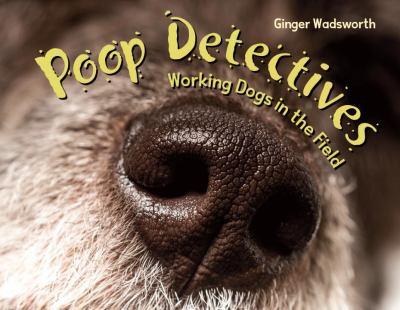
Poop detectives : working dogs in the field
How can dogs that sniff for excrement, urine, vomit, and mucus help protect animals from extinction? Scat-detection dogs like Wicket, Tucker, and Orbee are conservation heroes and pioneers in a cutting-edge field of science. Canine detec-tives use their super sense of smell to locate the scat of target animals. From loose bear dung to gooey whale poop, scat can tell scientists valuable information about an animal's sex, age, diet, and health--all without harming the animal or endanger-ing the researcher.
Available Copies by Location
| Location | |
|---|---|
| Stamford | Available |
Browse Related Items
- ISBN: 9781580896504
- Physical Description 80 pages : color illustrations ; 23 x 29 cm
- Publisher [Place of publication not identified] : [publisher not identified], 2016.
Content descriptions
| Bibliography, etc. Note: | Includes bibliographical references and index. |
Additional Information

Poop Detectives : Working Dogs in the Field
Click an element below to view details:
Excerpt
Poop Detectives : Working Dogs in the Field
As a puppy Freddie had so much energy that his owner couldn't handle him. Even with a daily run, Freddie managed to chew slippers, destroy a sofa, and nudge open kitchen cabinets and scatter the contents all over the apartment while his owner was at work.            Freddie, a border-collie mix whose ancestors loved nothing more than to run full-speed around a flock of sheep and herd them into a pen, was miserable in a tiny apartment. His sad yet desperate owner turned him in to the local animal shelter with a suggestion. Maybe someone who owned a ranch could adopt and love the wiry dog with the chocolate-brown eyes.            For days Freddie paced in his pen, wearing down his toenails and losing weight. Family after family toured the shelter in search of the right dog or cat. No one wanted Freddie. Shelter employees feared he would have to be put to sleep.            One morning a dog trainer walked into the shelter. She worked in the field with wildlife biologists and their canine assistants. One of her dogs was retiring, and the trainer was looking for a replacement. The perfect dog for the job would have to:            -Follow orders            -Be tough, energetic, and adventurous            -Find things that are nearly impossible to see            -Ride in a crate in the back of a truck            -Run long distances            -Be a fast learner            -Be obsessed with toys            The trainer visited many local shelters looking for the right dog. She knew the statistics. Less than 1 percent of all dogs qualify to become a detection canine.            She strolled up and down the rows of dog pens. While casually studying each dog, she bounced a yellow tennis ball. Dogs barked and bayed, pawed the wire cages, and whined for a friendly hand and a pat. Only one dog followed the tennis ball, his eyes never straying from the yellow orb. Every bit of Freddie's body tensed. He wanted that ball more than anything! And that was exactly what the trainer was looking for--a dog with the drive to work relentlessly for a special reward, like the tennis ball.            That day Freddie left the dog shelter with the dog trainer. He pranced to her pickup, carrying the tennis ball in his mouth. Freddie had been rescued from certain death, and now he had a chance to begin a new life. He was about tostart an intense training program. If successful, he would join an elite group of dogs that travel the world sniffing for wildlife scat, urine, horns, and hair--and sometimes the animals themselves.            Freddie had a chance to make a career change, as trainers sometimes call it. He wasn't a good pet. Would he succeed at his new job? Excerpted from Poop Detectives: Working Dogs in the Field by Ginger Wadsworth All rights reserved by the original copyright owners. Excerpts are provided for display purposes only and may not be reproduced, reprinted or distributed without the written permission of the publisher.


